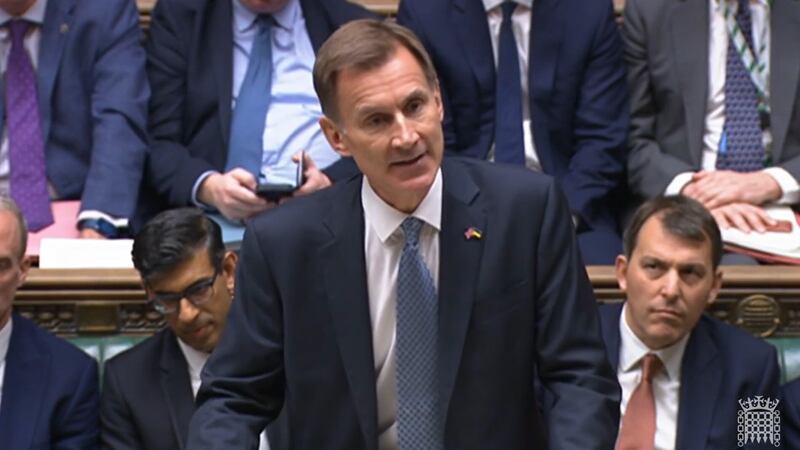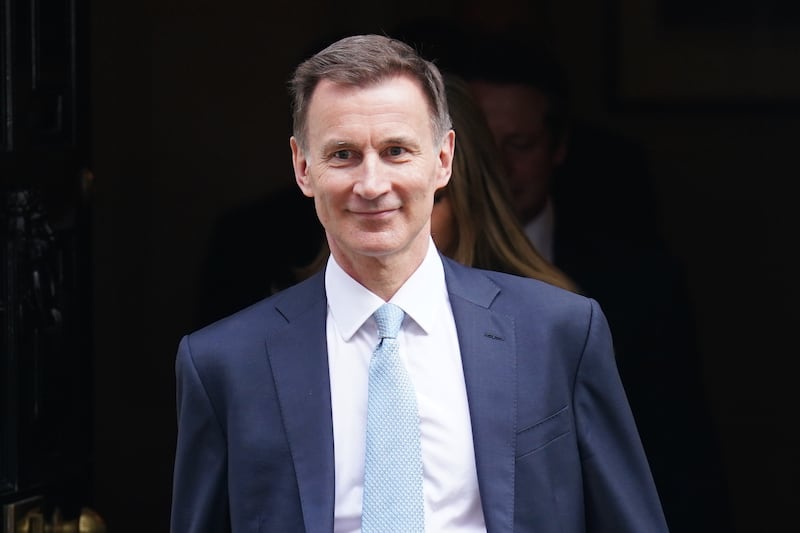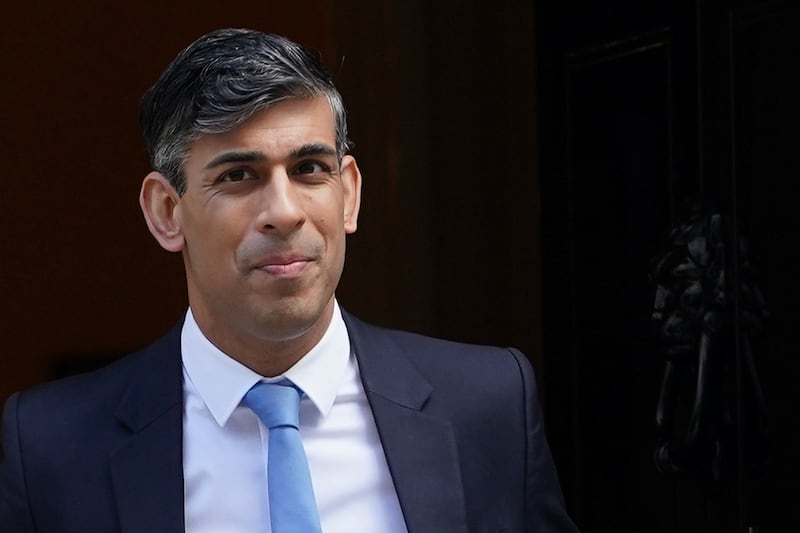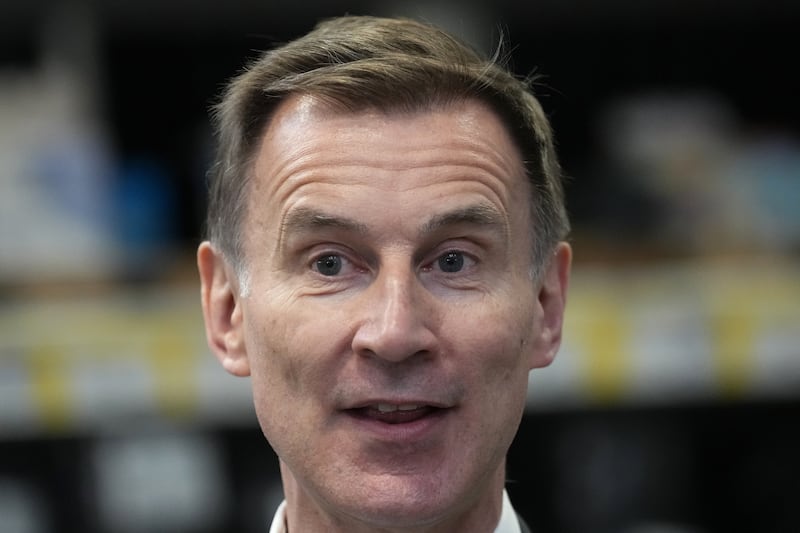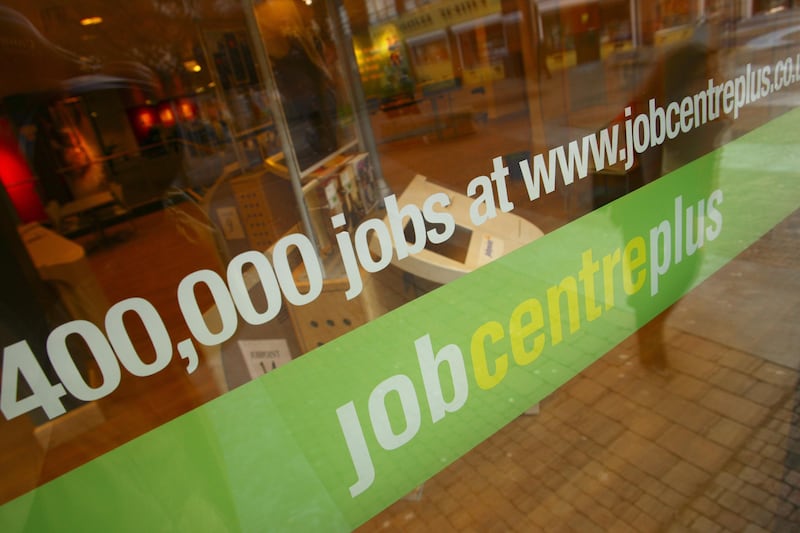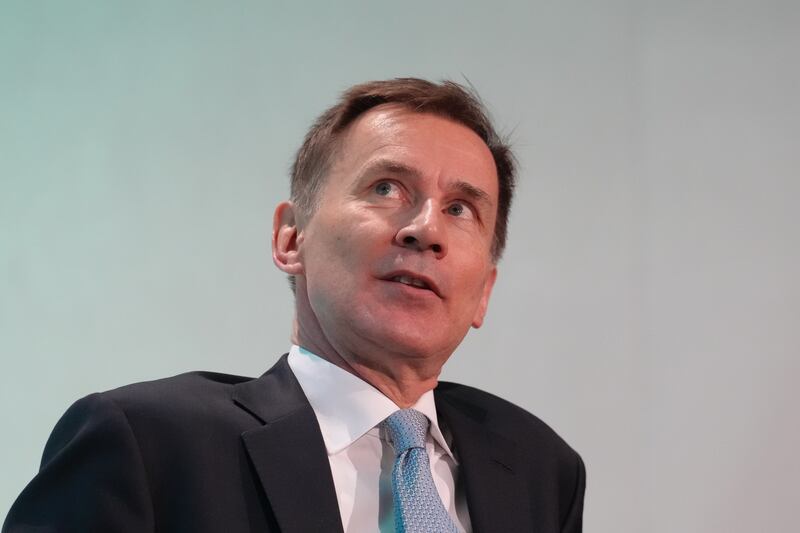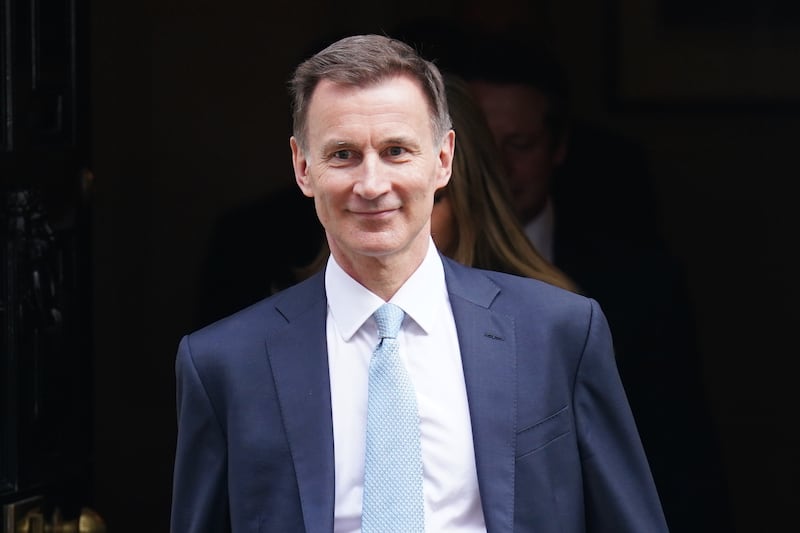British chancellor Jeremy Hunt has confirmed more people will pay the top rate of income tax as he promised to "tackle the cost-of-living crisis" and "rebuild our economy" with plans for tax rises and spending cuts.
Mr Hunt said there would be a "shallower downturn" as a result of his measures but the Office for Budget Responsibility (OBR) believed the economy was "now in recession".
The chancellor also revealed an extra £650 million for Northern Ireland as he unveiled funding plans for the NHS.
Mr Hunt said he will increase the NHS budget by £3.3bn in each of the next two years.
The chancellor told MPs he recognises that "efficiency savings alone will not be enough to deliver the services we all need".
He went on: "So because of difficult decisions taken elsewhere today I will increase the NHS budget, in each of the next two years, by £3.3bn.
"The chief executive of the NHS, Amanda Pritchard, has said this should provide sufficient funding for the NHS to fulfil its key priorities, she said it shows the Government is serious about its commitment to prioritise the NHS."
Detailing the Barnett formula, he said: "The NHS and schools in Scotland, Wales, and Northern Ireland face equivalent pressures so the Barnett consequentials of today's statement mean an extra £1.5bn for the Scottish Government, £1.2bn for the Welsh Government, and £650m for the Northern Ireland Executive."
Uplift in NHS and education spending in England will produce a £650m Barnett consequential for Stormont states Jeremy Hunt, which matches the projected overspend by departments in the current financial year. #AutumnStatement
— Ryan McAleer (@RyanMcAleerbiz) November 17, 2022
The chancellor also said he will increase state pensions in line with inflation in April, announcing the "biggest ever cash increase in the state pension".
Mr Hunt confirmed the threshold for the top rate of income tax of 45 per cent will decrease from £150,000 to £125,000.
Allowances and thresholds for income tax, national insurance and inheritance tax will be frozen for a further two years, to April 2028
Mr Hunt told MPs his three priorities were "stability, growth and public services", as he delivered his autumn statement.
The OBR forecast the UK economy would shrink by 1.4% next year, Mr Hunt said.
"The OBR forecast the UK's inflation rate to be 9.1% this year and 7.4% next year," he said.
"They confirm that our actions today help inflation to fall sharply from the middle of next year.
"They also judge that the UK, like other countries, is now in recession. Overall this year, the economy is still forecast to grow by 4.2%.
"GDP (gross domestic product) then falls in 2023 by 1.4%, before rising by 1.3%, 2.6%, and 2.7% in the following three years.
"The OBR says higher energy prices explain the majority of the downward revision in cumulative growth since March.
"They also expect a rise in unemployment from 3.6% today to 4.9% in 2024 before falling to 4.1%."
Mr Hunt was setting out a package of £30 billion of spending cuts and £24 billion in tax rises over the next five years.
His package is in stark contrast to his predecessor Kwasi Kwarteng's ill-fated plan for £45 billion of tax cuts, less than two months ago, which spooked the markets, pushed up the cost of borrowing and contributed to the downfall of Liz Truss' short-lived administration.
Mr Hunt said: "I understand the motivation of my predecessor's mini-budget and he was correct to identify growth as a priority. But unfunded tax cuts are as risky as unfunded spending."
Mr Hunt said repairing the nation's finances involved "taking difficult decisions".
He told MPs: "Anyone who says there are easy answers is not being straight with the British people: some argue for spending cuts, but that would not be compatible with high-quality public services.
"Others say savings should be found by increasing taxes, but Conservatives know that high tax economies damage enterprise and erode freedom.
"We want low taxes and sound money. But sound money has to come first because inflation eats away at the pound in people's pockets even more insidiously than taxes.
"So, with just under half of the £55 billion consolidation coming from tax, and just over half from spending, this is a balanced plan for stability."
Shadow chancellor Rachel Reeves said "the mess we are in is the result of 12 weeks of Conservative chaos but also 12 years of Conservative economic failure".
Ms Reeves told the Commons: "What does the chancellor have to offer today? More of the same, with working people paying the price for his failure.
"The chancellor should have come here today to ask for forgiveness, at the very least he could have offered an apology, but no.
"Instead he says that his predecessor was correct in his analysis at the mini-budget, the mini-budget that put our economy into freefall.
"All the country got today was an invoice for the economic carnage that this government has created.
"Never again can the Conservatives be seen as the party of economic competence."
Key points from the British government's Autumn Statement
Here are the main points from Chancellor Jeremy Hunt's autumn statement:
Growth and recession
- The OBR has said that the UK is "now in recession", Mr Hunt said, but he added "overall this year, the economy is still forecast to grow by 4.2%".
- Mr Hunt promised his autumn statement will lead to a "shallower downturn" in the UK's finances.
- Underlying debt as a percentage of GDP is expected to fall from a peak of 97.6% of GDP in 2025-26 to 97.3% in 2027-28.
- Mr Hunt announced two new fiscal rules, that underlying debt must fall as a percentage of GDP by the fifth year of a rolling five-year period, and that public sector borrowing, over the same period, must be below 3% of GDP.
Pay and support with the cost of living
- The energy price guarantee scheme will increase from £2,500 for the average household to £3,000 for 12 months from April, Mr Hunt confirmed.
- The Government will introduce additional cost-of-living payments for the "most vulnerable", with £900 for those on benefits, £300 for pensioners and £150 for those on a disability benefit.
- The Chancellor said he will cap the increase in social rents at a maximum of 7% in 2023/24, saving the average tenant £200 next year.
- Mr Hunt has accepted a recommendation to increase the national living wage by 9.7%, making the hourly rate £10.42 from April 2023.
Inflation
- The Chancellor told MPs the Office of Budget Responsibility (OBR) has confirmed "global factors" are the "primary cause" of inflation.
- The OBR forecasts the UK's inflation rate to be 9.1% this year and 7.4% next year.
- He said the autumn statement will cause inflation to "fall sharply from the middle of next year".
- The Chancellor confirmed the Bank of England's remit will not be changed and it has his "wholehearted support in its mission to defeat inflation".
Tax
- Mr Hunt reduced the threshold at which the top rate of income tax is paid from £150,000 to £125,140, but said he was not raising headline rates of taxation. He said those earning £150,000 or more will pay just over £1,200 more a year.
- Mr Hunt said he would protect the increases in departmental budgets already set out in cash terms, before growing resource spending at 1% a year in real terms over the next three years. He said public spending would grow "slower than the economy".
- Electric vehicles will no longer be exempt from Vehicle Excise Duty from April 2025 to make the motoring tax system "fairer".
- Mr Hunt increased the windfall tax on oil and gas giants from 25% to 35% and imposed a 45% levy on electricity generators to raise an estimated £14 billion next year.
- On business rates, Mr Hunt said the Government will proceed with the revaluation of business properties from April 2023.
- The stamp duty cuts announced in the mini-budget will remain in place but only until March 31 2025. Mr Hunt told the House the OBR expects housing activity to slow over the next two years.
- On business taxes, the Chancellor said he had decided to freeze the Employers National Insurance Contributions threshold until April 2028. "We will retain the Employment Allowance at its new, higher level of £5,000," he said.
- The Chancellor rejected calls to put VAT on independent school fees.
Health
- Mr Hunt said he will increase the NHS budget by an extra £3.3 billion in each of the next two years.
- The NHS will be asked to "join all public services in tackling waste and inefficiency".
- Mr Hunt said the NHS would publish an independently-verified plan for the number of doctors, nurses and other professionals needed in five, 10 and 15 years' time.
- He allocated for adult social care additional grant funding of £1 billion next year and £1.7 billion the year after.
Spending and benefits
- Mr Hunt said "with just under half of the £55 billion consolidation coming from tax, and just over half from spending, this is a balanced plan for stability".
- The Chancellor said he will invest an extra £2.3 billion per year in schools over the next two years.
- It will "not be possible" to return to the 0.7% overseas aid target "until the fiscal situation allows", Mr Hunt said.
- He said he will maintain the defence budget at at least 2% of GDP.
- Mr Hunt said he would move back the managed transition of people from employment and support allowance on to Universal Credit to 2028.
- The implementation of the Dilnot reforms will be delayed for two years, Mr Hunt confirmed, announcing an increase in funding for the social care sector of up to £2.8 billion next year and £4.7 billion the following year.
- The Barnett consequentials of the autumn statement mean an extra £1.5bn for the Scottish Government, £1.2bn for the Welsh Government, and £650m for the Northern Ireland Executive.
- The Chancellor said he would not cut "a penny" from Government capital budgets over the next two years, and would then maintain them at that level for the next three years.
- Working age and disability benefits will increase in line with inflation, with a rise of 10.1%, costing £11 billion.
- State pensions will increase in line with inflation in April, as Mr Hunt announced the "biggest ever cash increase in the state pension".
Climate and energy
- Mr Hunt said "we remain fully committed to the historic Glasgow Climate Pact agreed at COP26 including a 68% reduction in our emissions by 2030".
- The Chancellor said he would add an extra £6 billion of investment in energy efficiency from 2025 to help meet a new ambition of reducing energy consumption from buildings and industry by 15% by 2030, adding this could - according to today's prices - save £28 billion from the national energy bill or £450 off the average household bill.
- The Government will proceed with the new nuclear plant at Sizewell C.
